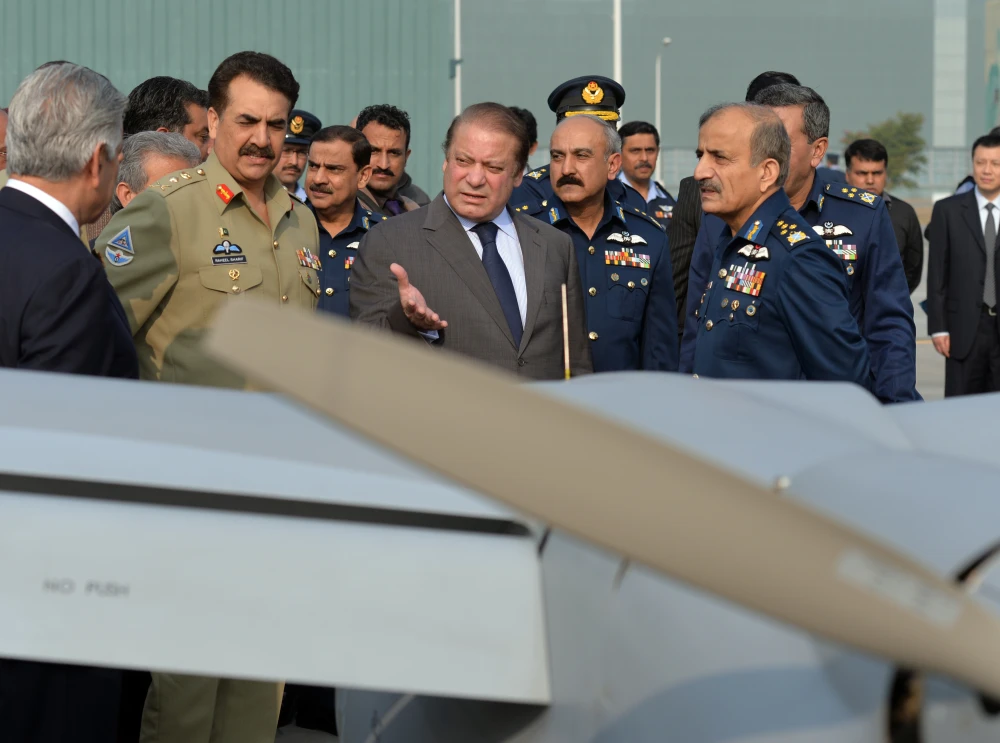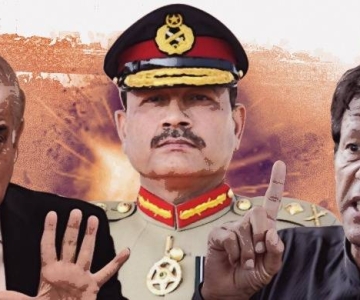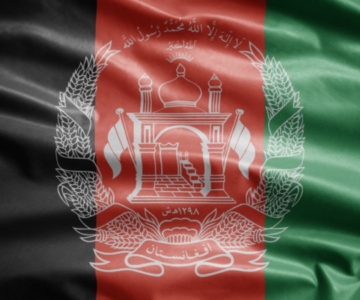Pakistan’s Prime Minister Nawaz Sharif (C) inspects the indigenously manufactured surveillance drone at the Pakistan Aeronautical Complex in Kamra, some 65 km west of Islamabad on December 18, 2013, as Pakistani air chief Tahir Rafique Butt (R) and army chief Raheel Sharif (L) look on. Pakistan on December 18 launched production of a new version of a combat aircraft featuring upgraded avionics and weapons system. The plane, to be called Block-II JF-17, will be manufactured at the Pakistan Aeronautical Complex west of Islamabad, which has so far produced 50 older-model Block-I JF-17s for the air force. AFP PHOTO/Aamir QURESHI (Photo credit should read AAMIR QURESHI/AFP/Getty Images)
The fall of Kunduz jeopardizes Pakistan’s quest for internal stability.
While there will be obvious security and policy ramifications for Afghanistan and the United States, what will it mean for Pakistan?
For Pakistan, the fall of Kunduz means that its quest for internal stability could be in jeopardy. Pakistan has to use its leverage over the Taliban to bring them to the negotiating table. Pakistani Army chief, General Raheel Sharif, has once again called for restarting the Afghan reconciliation process for the security of the region and added that the Chinese investment in the China-Pakistan Economic Corridor could be shared with Afghanistan. Gen. Sharif’s suggestion can only materialize once the Taliban are contained and the Afghan government is strengthened.
There is a consensus among most experts that if the Taliban’s power grows in Pakistan’s neighborhood, it could exacerbate Pakistan’s internal security problems. Pakistani Taliban, currently fleeing to Afghanistan due to the military’s clean-up operations, will find support from their Afghan counterparts. The Afghan Taliban might not support the Pakistani Taliban or fight alongside them, but they will let the Pakistani Taliban regroup on Afghan soil in order to mount attacks within Pakistan which will come back to haunt Pakistan.
Things have changed in the recent years. Pakistan’s treatment of the Taliban as a lever in the regional game is well known and even admitted to by former President Pervez Musharraf but the Pakistani military cannot risk a Talibanized Pakistan. It won’t be long before the Pakistani and Afghan factions unite, sparking a Taliban war against the nascent Islamic State, who is making inroads in the region. Pakistan’s trusted ally China does not want it nor can Russia, a budding military partner of Pakistan, endorse such a development.
One of the key questions remaining is whether the security establishment within Pakistan has internal consensus on the way forward. Recent reports on the killing of the Taliban’s shadow governor for Kunduz, Maulvi Salam, by ANSF and U.S. airstrikes raise questions about the ongoing military operations in Pakistan. The reports also mention that Pakistani militia Lashkar-e-Taiba commander, Haris, may have been killed too. Militancy has to be viewed as an integrated, complex whole. By ignoring the groups that do not directly target the Pakistani state, Pakistan may just be complicating its future.
Of all the elements leading to the Taliban’s capture of Kunduz, the weaknesses of governance in Afghanistan cannot be overlooked. Pakistani journalist Sami Yousafzai reported that the locals in Kunduz are complaining that the Afghan government had given a free hand to warlords and private militias, in particular, Mir Alam Khan. It is also unclear for how long the United States will subsidize the Afghan government, and more importantly, the ANSF. Discussions, however, about keeping the minimum coalition troops in Afghanistan beyond 2016 have commenced.
Difficult as it may seem now, the peace process needs to be revived urgently. In a welcome development, Pakistan’s top diplomat, Foreign Secretary Aizaz Ahmad Chaudry, said yesterday that Pakistan will not accept the occupation of Afghan territory by any group. Pakistani Prime Minister Nawaz Sharif needs to take the initiative and fulfill his earlier commitment to tackling terrorism in the region.
The security of Afghanistan is the root of South Asia’s future. For China to act as mediators in the peace process and expand westward, China needs a stable Pakistan. For Pakistan to be stable, Afghanistan must be also. Pakistan and the world powers the United States, China, and the European Union will have to play their role in preventing South Asia from sliding into another anarchic phase.
Original Article: https://foreignpolicy.com/2015/10/02/watching-kunduz-collapse-from-the-sidelines/



